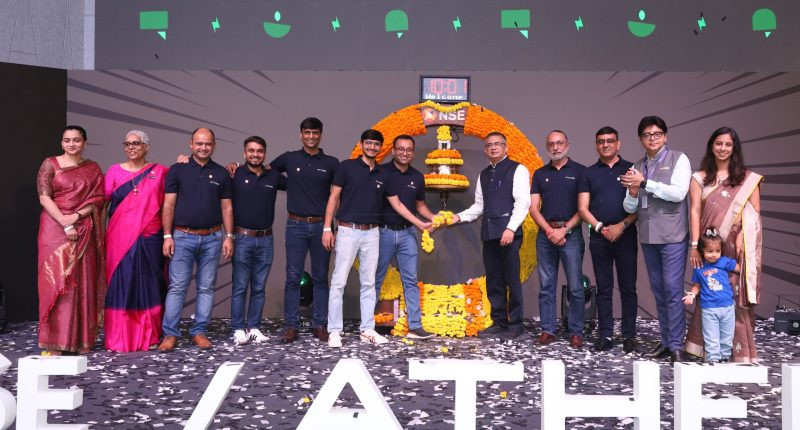Ather Energy, the Hero group backed EV maker, made a successful public market debut at Indian bourses today, even though the debut was largely muted. Stock listed at marginal gains of 2%, while trading 0.7& above its offer price at the time of writing this piece.
Ather’s public market debut comes after a rather long road to an IPO. The company, while filling IPO this time around, had to cut down IPO size significantly, considering the overall public market sentiment, as well as public market’s rather unfavourable feel towards new tech IPOs. The company had originally sought a post-money valuation between $1.5 billion and $2 billion. However, following the reduction in its offering, Ather is trading at a valuation of near about $1.3 billion.
As part of the revised offering, Ather Energy issued new shares in the market, alongside an offer for sale (OFS) by existing shareholders. The updated prospectus shows that 11.1 million shares will be sold by these shareholders, a decrease from the previously planned 22 million shares. Ather’s co-founders, Tarun Mehta and Swapnil Jain, are some of the major stakeholders who are offloading shares in this IPO, and will be joined by investors such as Tiger Global Management and the National Investment and Infrastructure Fund (NIIF).
However, Hero MotoCorp, Ather’s largest shareholder, with a stake of around 40%, will not sell any of its shares during this offering.
The company raised ₹2,981.06 crore at the upper end of the price band of ₹321 apiece. Ather plans to use the raised funds setting up a new factory in Maharashtra, while also making repayment of certain corporate borrowings. It has also proposed minimal investment in R&D and for marketing initiatives or other general corporate purposes.
In terms of financials, the company has incurred losses ever since its inception, though capturing 11.5% of the market. In FY24, Ather’s loss before taxes amounted to ₹1059.7 crore, significantly higher than ₹864.5 crore in FY23 and ₹344.1 crore in FY22.
Ather’s IPO subscription had already pointed to a muted debut. The retail investors’ portion was subscribed 1.78 times. Qualified Institutional Buyers (QIBs) did show demand, subscribing 1.70 times, while Non-Institutional Investors (NIIs) subscribed only 66% of their allocated shares. It was the company’s employee pool that showed most interest, with their portion subscribed 5.43 times.
The Tech Portal is published by Blue Box Media Private Limited. Our investors have no influence over our reporting. Read our full Ownership and Funding Disclosure →






